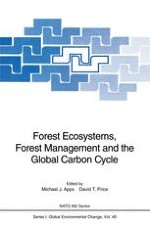1996 | OriginalPaper | Buchkapitel
Climate change and management of insect defoliators in boreal forest ecosystems
verfasst von : W. Jan A. Volney
Erschienen in: Forest Ecosystems, Forest Management and the Global Carbon Cycle
Verlag: Springer Berlin Heidelberg
Enthalten in: Professional Book Archive
Aktivieren Sie unsere intelligente Suche, um passende Fachinhalte oder Patente zu finden.
Wählen Sie Textabschnitte aus um mit Künstlicher Intelligenz passenden Patente zu finden. powered by
Markieren Sie Textabschnitte, um KI-gestützt weitere passende Inhalte zu finden. powered by
Insects are the most diverse group of terrestrial animals. Not surprisingly, they influence several ecosystem processes and thus have a profound influence in most terrestrial ecosystems by occupying a myriad o f niches. The reciprocal interaction of insects with forest plants includes some of the most finely tuned examples of mutualism known as well as some of the most destructive interactions between insects and plant populations. These interactions have important consequences to the development of forest ecosystems and insects may regulate forest productivity (Mattson and Addy 1975). Insects also have a more indirect role in forested ecosystems in that they are often important regulators of herbivore populations, may be important food items for vertebrate populations, and perform a significant function in nutrient cycling in concert with micro-organisms. (See also Chapter 15, Galinski and Witowski). However, both insects and plants are poikilotherms and thus their activities in forest ecosystems are regulated to a large extent by climate
